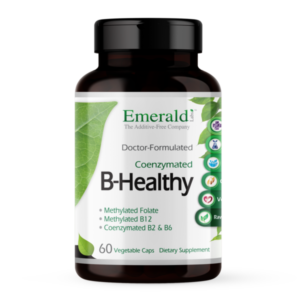Super B Vitamins
Today, many Americans are much more stressed because of things like the pandemic, financial struggles, personal health, and environmental issues. As a result, many people have become more tired, depressed, experienced a decrease in memory and focus, and weakened immune systems.*†
Our in house formulator, Dr. Mark Stengler NMD says, “When you have ordered blood level tests for B vitamins (B1 (thiamine), B2 (riboflavin), B3 (niacin), B5 (pantothenic acid), B6 (pyridoxine), B7 (biotin), B12 (Cobalamin), Folate) as many times as I have, you notice a typical pattern of low or deficient B vitamins with patients. When you improve the body’s levels of B vitamins through the right foods and specific B vitamin supplements, dramatic changes happen, and often very quickly.”*
A Natural Energy Booster
Increasing levels of vitamin B can quickly improve energy.*
“A deficiency of just one of the B vitamins will negatively affect the complex production of energy (ATP) in your cells. While people usually think of Supplemental B12 for energy, one will typically achieve better results with a full spectrum B complex since many of the B’s are involved in ATP production,” says Dr. Mark Stengler NMD.*
Also, B vitamins are very important for focus, memory, depression, anxiety, and resistance to stress and illness. There are many other benefits that occur in the body when optimal levels of B vitamins are achieved, such as improved detoxification, more efficient production of neurotransmitters (brain chemicals), better nerve flow and muscle function, and improved hormone metabolism.*†
B Vitamins and the Gut

Your body cannot make B vitamins on its own except for small amounts produced by the friendly bacteria in the gut. Healthy gut bacteria can create biotin, cobalamin, niacin, pantothenic acid, pyridoxine, and thiamin.*†
But, there is something called dysbiosis that the average person experiences… it’s an overgrowth of disease-promoting bacteria and a deficiency of health-promoting bacteria in the gut. Problems like this make dietary intake and high quality, highly absorbable (gut and cellular) B vitamins very important.*†
Things That Deplete B Levels
Many medications deplete the body of B vitamins.
Examples include acid reflux medications such as the Proton Pump Inhibitors (PPIs), Prednisone, Metformin, Antibiotics, Birth Control Pills, Anti-seizure medications, Antidepressants, Chemotherapy drugs such as Methotrexate, and several others.*†
Dr. Mark Stengler NMD says, “Research has shown that the elderly who take three or more medications are prone to B vitamin deficiencies such as B2, B6, Folate, and B12.”*†
People with absorption issues, such as those with acid reflux and taking PPIs, Crohn’s Disease, or Ulcerative Colitis, may have problems absorbing B vitamins. Many other disease states deplete the body of B vitamins.*†
B12 and Folate Power
Did you know the most biologically active form of B12 is methylcobalamin? The natural form of methylcobalamin works wonders in helping people with fatigue, depression, and some forms of neuropathy.*
Folate is also misunderstood by many in the medical profession. Several naturally occurring folates are found in food and the human body. Folic acid is technically a synthetic nutrient, unlike the natural folates found in food or some supplements (such as methylfolate). Folate is essential for the life-sustaining process of methylation.*
Methylation is required for normal cell division, nerve health, mood, the metabolism of homocysteine, and the metabolism of amino acids.*
When a person consumes synthetic folic acid as found in many B complex supplements, it must go through several steps to be converted into its active form known as 5-methyl-tetrahydrofolate (5-MTHF). Due to common genetic mutations (MTHFR genes), about half of the population does not metabolize folic acid well into its active form. A better solution is to get folate in its natural food form, known as methylfolate. Also, B12 (methylcobalamin) and B3 work in tandem with folate in the process of methylation.*
Take a look at Dr. Stengler's Vitamin Chart below:
Function: Energy metabolism (carbohydrate metabolism), neurological activity, brain and heart function.
Sources: Pork, beef, liver, brewer’s yeast, whole grains, brown rice, legumes
Deficiency Signs: Beriberi, a condition characterized by fatigue, anorexia, weight loss, gastrointestinal disorders, fluid retention, weakness, heart abnormalities, stunted growth, cyanosis, convulsions, poor memory
Supplemental Optimal Intake: 50 mg
Toxicity: None reported
Function: Energy production, fatty acid and amino acid synthesis, & methylation.
Sources: Organ meats such as liver, milk products, whole grains, green leafy vegetables, eggs, mushrooms, broccoli, asparagus, and fish.
Deficiency Signs: Cracking at the corners of the mouth, inflamed tongue, reddening of the eyes, vision problems, dermatitis, nerve damage, decreased neurotransmitter production, malformations and retarded growth in children and infants.
Supplemental Optimal Intake: 50 mg
Toxicity: None reported
Function: Energy production, formation of steroid compounds, red blood cell formation, cognitive function, and mood.
Sources: Organ meats, peanuts, fish, yeast, poultry, legumes, milk, eggs, whole grains, and orange juice.
Deficiency Signs: Pellagra, a condition characterized by dermatitis, diarrhea, dementia, Depression; schizophrenia, weakness, lassitude, anorexia.
Supplemental Optimal Intake: 10 mg
Toxicity: Large doses can cause dilation of the blood vessels and flushing of the skin and elevated liver enzymes.
Function: Metabolism of carbohydrates, proteins, and fats for energy production; production of adrenal hormones and red blood cells
Sources: Organ meats, fish, chicken, eggs, cheese, whole grains, avocados, cauliflower, sweet potatoes, oranges, strawberries, yeast, & legumes.
Deficiency Signs: Numbness and shooting pains in the feet; fatigue
Supplemental Optimal Intake: 250 mg
Toxicity: None reported
Function: Formation of body proteins, neurotransmitters, red blood cells; immunity
Sources: Meats, poultry, egg yolk, soy, peanuts, bananas, potatoes, whole grains, and cauliflower.
Deficiency Signs: Mood abnormalities, sleep problems, anemia, impairment of nerve function, eczema, cracking of the lips and the tongue, premenstrual syndrome, and depression.
Optimal Intake: 20 mg to 50 mg
Toxicity: Very high dosages can cause nerve symptoms—numbness and tingling.
Function: Methyl donor that is required for many processes in the body (reduces homocysteine levels), cardiovascular health, red blood cell production, skin and nail health, cell division, production of neurotransmitters and hormones. Prevents neural tube defects (must be taken by the mother in early pregnancy).
Sources: Dark green vegetables—spinach, kale, broccoli, asparagus—as well as organ meats, kidney beans, beets, yeast, orange juice, whole grains.
Deficiency Signs: Macrocytic anemia, fatigue, irritability, weakness, weight loss, anorexia, dyspnea, sore tongue, palpitations, forgetfulness, digestive upset, & diarrhea.
Optimal Intake: 400 micrograms (mcg)
Toxicity: None
Function: Synthesis of DNA, red blood cells; nerve development, energy production
Sources: Gut bacteria synthesis, organ meats, clams, oysters, soy, milk products, cheese, chlorella, and spirulina.
Deficiency Signs: Macrocytic anemia; glossitis; spinal cord degeneration; digestive upset; fatigue; mental abnormalities, including irritability, and depression.
Optimal Intake: 200 mcg to 500 mcg
Toxicity: None reported
Function: Metabolism of fats, proteins, and carbohydrates; nail and hair growth, skin health.
Sources: Gut bacterial synthesis, organ meats, cheese, soybeans, eggs, mushrooms, whole wheat, and peanuts.
Deficiency Signs: Seborrheic dermatitis, brittle nails and hair
Optimal Intake: 300 mcg
Toxicity: None reported
Increase Your B's
Try our B Healthy complex. It contains therapeutic and activated forms of essential B vitamins, including B12 and folate. If you have low energy, mood problems, high stress, and need a boost, then get more B vitamins from natural food sources and quality B vitamin supplements.*†
Use code VITAMINB to save 15% off instantly!
Formulated by Dr. Mark Stengler NMD.
Known as America’s Natural Doctor to his patients, readers and audiences across North America, Mark Stengler is a licensed naturopathic medical doctor. His passion is to combine the best of conventional and natural medicine to achieve optimized health for his patients. Dr. Stengler has personally formulated each of the Emerald Labs Additive-Free products according to the high standards of his health practice. Read more about Dr. Stengler…
*These statements have not been evaluated by the Food and Drug Administration. This product is not intended to diagnose, treat, cure or prevent disease. CONSULT YOUR PHYSICIAN OR OTHER QUALIFIED HEALTH CARE PROVIDER FOR ADVICE REGARDING ANY MEDICAL CONDITION. DO NOT ATTEMPT TO SELF-DIAGNOSE OR TREAT ANY MEDICAL CONDITION.
†Selected References
Das P, Babaei P, Nielsen J. Metagenomic analysis of microbe-mediated vitamin metabolism in the human gut microbiome. BMC Genomics. 2019;20.
Mospan C. Drug-Induced Nutrient Depletions: What Pharmacists Need to Know. US Pharmacist. 2019;12:18-24. https://www.uspharmacist.com/article/druginduced-nutrient-depletions-what-pharmacists-need-to-know.
Stengler M, Balch J, Young-Balch R. Prescription For Natural Cures. 3rd ed. Turner Publishing; 2016.



